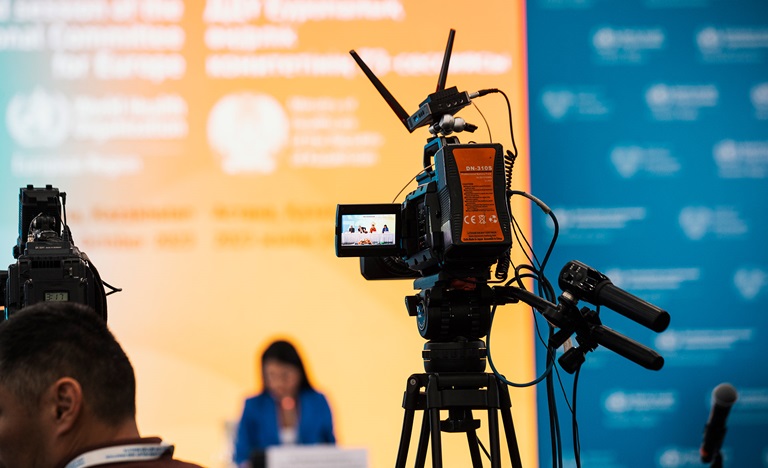
Newsroom
Media Contacts
![]()
WHO/Europe Press Office
Email: eupress@who.int
Latest news
All →No place for cheap alcohol: Scotland’s minimum unit pricing policy is protecting lives
Pricing policies are among the most cost-effective measures that countries can use to reduce alcohol consumption and harms. Published in June 2023, the independent evaluation of Scotland’s minimum unit pricing (MUP) policy concluded that in 2.5 years of operation, it has prevented hundreds of avoidable deaths and reduced health inequalities linked to alcohol consumption.
The report, undertaken by Public Health Scotland, found strong evidence that MUP in Scotland reduced deaths directly caused by alcohol consumption as well as hospital admissions due to chronic causes. Deaths caused by alcohol dropped by an estimated 13.4% and hospital admissions by 4.1%, with the largest reductions seen among men and those living in the most deprived areas.
Why are pricing policies so effective at reducing alcohol harms?
Evidence shows that there is a direct connection between the affordability of alcohol, how much alcohol is consumed, and the harm it causes to individuals, families and society. WHO has identified pricing policies, in particular increasing alcohol excise tax, as 1 of the 3 best buys – cost-effective policy measures that maximize health gains for the least resources invested.
Alcohol harms tend to be concentrated among heavier drinkers, particularly those from lower socioeconomic groups. By setting a floor price based on ethanol content, below which alcohol products cannot be sold, MUP raises the prices of the cheapest, strongest products, which heavier drinkers tend to purchase.
The Scottish evaluation demonstrates in a real-world setting that raising the price of the cheapest alcohol reduces overall population consumption and benefits the heaviest drinkers the most. It provides robust evidence for Parliamentarians in Scotland as they decide upon next steps, and for other countries that are considering following Scotland’s policy example.
The evaluation of MUP in Scotland
Alcohol is a leading cause of premature death and poor health in Scotland. According to Public Health Scotland, approximately 23 people die from alcohol use every week. Alcohol also harms the population differently, with people living in poorer areas 5 times more likely to die from alcohol consumption than those living in wealthier areas.
Linked to other policy measures, the Alcohol (Minimum Pricing) (Scotland) Act 2012 set out to address this. It provided the legal framework to ensure that alcohol products cannot be sold in licensed premises for less than 50 pence per unit (10 ml or 8 g of pure alcohol) per sale price of alcoholic products.
After a series of unsuccessful legal challenges by the alcohol industry, the policy was eventually implemented on 1 May 2018. The law includes a so-called sunset clause, requiring that MUP cease after 6 years of operation unless the Scottish Parliament votes for it to continue.
Now that this comprehensive report has been produced, covering 2.5 years of operation, Scottish Parliamentarians have clear and robust evidence of positive outcomes. In addition to the reduced deaths and hospital admissions noted above, MUP reduced alcohol consumption in Scotland by 3%. The greatest reductions in sales were for products that increased most in price.
Were negative impacts observed?
The evaluation found no clear evidence of substantial negative impacts on the alcoholic beverage industry or social harms at the population level. However, MUP may have had limited effectiveness in reducing consumption for people with alcohol dependence, making it clear that this subgroup needs timely and evidence-based treatment and wider support.
“Overall, the evidence shows that MUP has had a positive impact on improving health outcomes, including alcohol-related health inequalities, and can play a part in addressing the preventable harms that affect far too many people, families and communities,” said Ms Clare Beeston of Public Health Scotland, who led the evaluation of MUP.
However, she added, “MUP alone is not enough to address the specific and complex needs of those with alcohol dependence who will often prioritize alcohol over other needs, and it is important to continue to provide services and any wider support that addresses the root cause of their dependence.”
Evidence to encourage more countries across Europe to adopt alcohol pricing policies, including MUP
In its 2022 report “No place for cheap alcohol: the potential value of minimum pricing for protecting lives”, WHO/Europe emphasized the potential for MUP to be used in combination with other complementary policies, including taxation, to reduce harm and increase government tax revenue. It noted that MUP should be considered as a complement to taxation, not as an alternative.
WHO/Europe also called for further evidence and evaluation studies to understand the long-term consequences of MUP. This official report from Scotland makes an important contribution to evidence supporting the adoption of MUP as one of the policies that will reduce alcohol consumption and harms, and address health inequalities.
“It is very encouraging to have this robust evidence to support the efficacy of Scotland’s MUP alcohol policy, and to see that several other countries in the WHO European Region are following Scotland in implementing or considering implementation of MUP,” affirmed Dr Carina Ferreira-Borges, Regional Adviser for Alcohol, Illicit Drugs and Prison Health at WHO/Europe. “Learning from Scotland's experience, countries can work towards creating safer communities and improving public health outcomes for all, leaving no one behind due to alcohol harms.”
Looking forward, and drawing on the European Framework for Action on Alcohol 2022–2025, which was unanimously adopted by all 53 Member States in 2022, Dr Ferreira-Borges emphasized that “there is no room for complacency”. She concluded, “To maintain their effectiveness, pricing policies need to be linked to inflation and regular adjustment is needed so that affordability of alcohol does not increase over time.”




